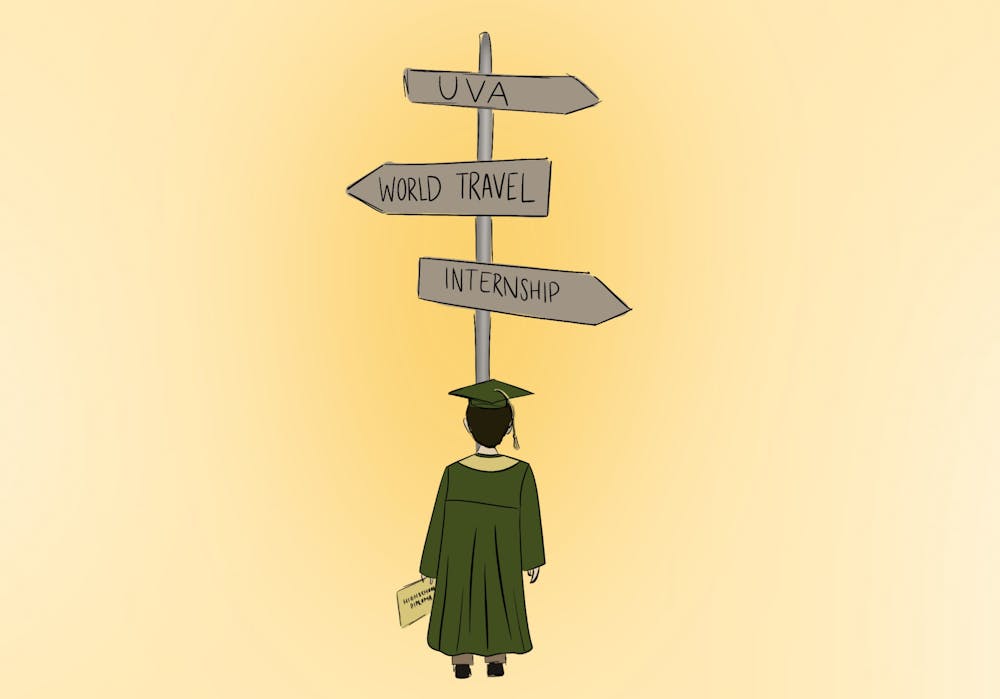While the period between finishing high school and starting college is typically a few months, some students embark on a longer journey by taking a gap year, which may entail traveling abroad, working locally or volunteering for a non-profit organization. Many gap-year students initially have doubts about taking a year off from school, but the experience was worthwhile for these four University students. A gap year solidified their career goals, prepared them for college and broadened their outlooks on the world.
The decision to take a gap year does not come easy for all students. Fourth-year College student Sarah Rice traveled to Germany for the Congress-Bundestag Vocational Youth Exchange Program during her gap year. For her, going to a foreign country was not a foreign concept — she was familiar with gap years, as her brother had taken one in China. Still, she said she felt nervous taking a gap year during a time when it was not as common.
“Pre-pandemic, not that many people [took] gap years at all, and I feel like the ambiguity of it [was] a little bit frightening,” Rice said.
Many students also worry about the social and academic repercussions of taking a gap year. As they put their college degree on hold, they watch their high school peers progress through university life without them. Gap-year students also face the prospect of acclimating back into a traditional education after their break from the classroom. First-year College student Arianna La Motta said she initially doubted her decision to hold off on college.
“I felt unsure,” La Motta said. “[But] I was like, ‘I live in my own timeline … It's my own life.’”
Reassured that a gap year was a reset rather than a delay in her academic timeline, La Motta said taking a gap year helped her understand what lies in store for her outside of school. Nearing her high school graduation, she said she had been accepted into several colleges, but she felt that a gap year would help her solidify her academic goals.
“I had no idea what I wanted to do with my life, what I wanted to study or where I wanted to go,” La Motta said. “My head was all over the place.”
La Motta’s gap year experiences included working for a non-profit in Ecuador, traveling through Spain and taking art classes in Italy. She said taking her gap year helped her develop a clearer picture of what she wanted to do with her future.
“If you take a year off, you can decide [things] knowing better what you want,” La Motta said. “[You can] explore yourself to really know what you love and what you want out of your life.”
First-year College student Silas Marx echoed La Motta’s sentiment. While he had been admitted to the University already, he decided to take a gap year working with AmeriCorps NCCC, a service-based program where students complete community service projects across the United States. Marx worked in food banks and helped maintain trails across the west coast, which he said inspired him to shift his academic focus from engineering to public service.
“I think it just really helped me to gain focus [and] realize what I actually like. When you're in high school, you kind of just follow what everybody else does,” Marx said. “You don't really know what you want to do as much.”
Apart from undergoing a period of self-discovery, gap-year students develop unique life skills. First-year College Student Leela Trujillo participated in CBYX, the same gap year program that Rice did. Through this program, Trujillo interned at four places — a film studio, an alcohol rehabilitation facility, a marketing organization and the German parliament. She said the work challenged her to try new activities and meet new people.
“Not only does [a gap year] push you out of your own comfort zone … but you [also] just meet the most random, cool people,” Trujillo said.
While their gap years took them on exciting journeys, all four students eventually returned to school. When she arrived on Grounds for her first year, La Motta said she felt both eager and nervous to return to a traditional learning environment.
“I was missing school,” La Motta said. “But I was still a little nervous because I was like, ‘Okay, I haven't studied in more than a year. Do I still have it in me?’ And absolutely, you don't lose it in a year.”
While taking off a year may not set students back academically, Trujillo said her gap year made her feel disconnected from certain social circles. Upon arriving on Grounds, she said she had to familiarize herself with conventional activities of University life.
“You're going to have all of these experiences and have all these really cool memories,” Trujillo said. “[But others are] never going to relate to you in the exact same way.”
Despite challenges and nerves, students say taking a break from formal education led to a newfound realization of their passions, preparing them for college and life beyond. La Motta said her gap year helped her mature and handle any challenges she faced at the University.
“I can feel the difference,” La Motta said. “Coming to college with all that knowledge really just made me more grounded. I was more confident in myself and what I wanted to do and why I was here in college.”







